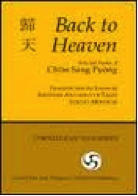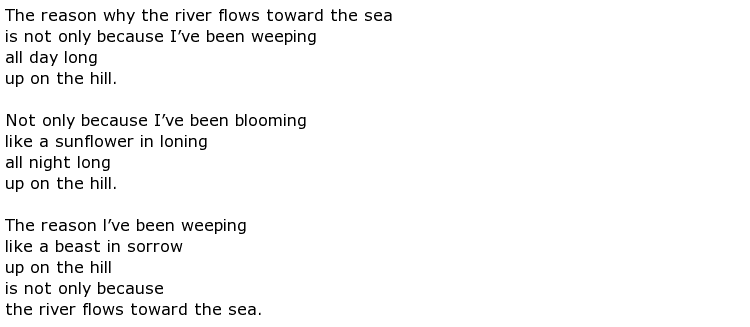 Cheon Sang-byeong was a Japanese-born writer who emigrated to South Korea at the age of 15 and became one of that country’s most famous and loved poets. Cheon suffered many dark times during his lifetime; he was tortured as a suspected spy, suffered ill health through alcoholism and was impotent. Amazingly, despite all this, he had a happy disposition and a constantly optimistic outlook on life.
Cheon Sang-byeong was a Japanese-born writer who emigrated to South Korea at the age of 15 and became one of that country’s most famous and loved poets. Cheon suffered many dark times during his lifetime; he was tortured as a suspected spy, suffered ill health through alcoholism and was impotent. Amazingly, despite all this, he had a happy disposition and a constantly optimistic outlook on life.
Cheon Sang-byeong was born on the 29th January 1930 in Japan and moved to the South Korean town of Masan at the conclusion of the Second World War in 1945, as soon as the country was liberated from Japanese rule. While still a school boy in Masan, Cheon began writing poetry and had his first poem, River Water, published. For one so young it was a very mature, intensive piece of work:

Upon leaving school Cheon studied at the Seoul National University for a short time but it is not known if he gained any qualifications from that. There is a gap in any recorded information about his life from student days up to 1967 but this proved to be a significant year for Cheon, who was now aged 37. A spying scandal, known as the “East Berlin Spy Incident”, erupted and changed his life forever. He was implicated in it and thrown into jail for six months. Here he was brutally tortured for information about any other participants in the spying allegations. His cruel treatment scarred Cheon both mentally and physically and he became an alcoholic on his release. He also found that the punishment received had made him impotent. He was found unconscious on the streets one day and committed to an institution with the intention of making him better. His friends though were not aware of this and, believing that he had died in prison, had a posthumous collection of his poetry published.
Despite these dark times Cheon made a full recovery and began to write regularly. He said that when he wrote it was with “the intention of transcending the immediate world”. He had a simple but effective style of writing, avoiding any use of decorative or superfluous words. There was raw emotion in his work with a candid and keen eye for the existential problems that he saw in the world. It was said that he used “substantial and condensed language to head the reader’s attention from his objective as the poet”.
It was his lofty aim to explore the origins of the universe and he believed in life after death. His most famous work was Return to Heaven and was a fascinating account of a man’s transition from life to death, and then on to the glorious state of afterlife. He saw that everyone could take that path, literally “returning” to heaven after a life on earth. It was simply moving between one world and another.
I am returning to heaven, the day on which my sojourn to this beautiful world ends. Go and say it was beautiful.
He tried to make sense of life and the reasons why humans must suffer so often, as he had for many years. He hoped that his poetry would reach a higher plane of thoughts and feelings, thus showing the reader that there is something much better beyond their simple earthly existence. He wanted to do this without any embellishments of sentimentality or romantic notions in his words.
Back to Heaven was seen as the work of “the happiest man in the world” with shafts of light shining through the dark days that he had endured. He could now see beauty instead of pain and suffering and modern readers are encouraged to share in this optimism. The author had suffered greatly and this seems to have inspired him to greater feelings of joy and expectation. His great poem describes the journey to heaven where a man does not “die” but simply traverses from one life to the next, literally going “back to heaven”. Once there he can describe to the angels how beautiful everything was.
Cheon Sang-byeong died on the 28th April 1993, aged 63.

